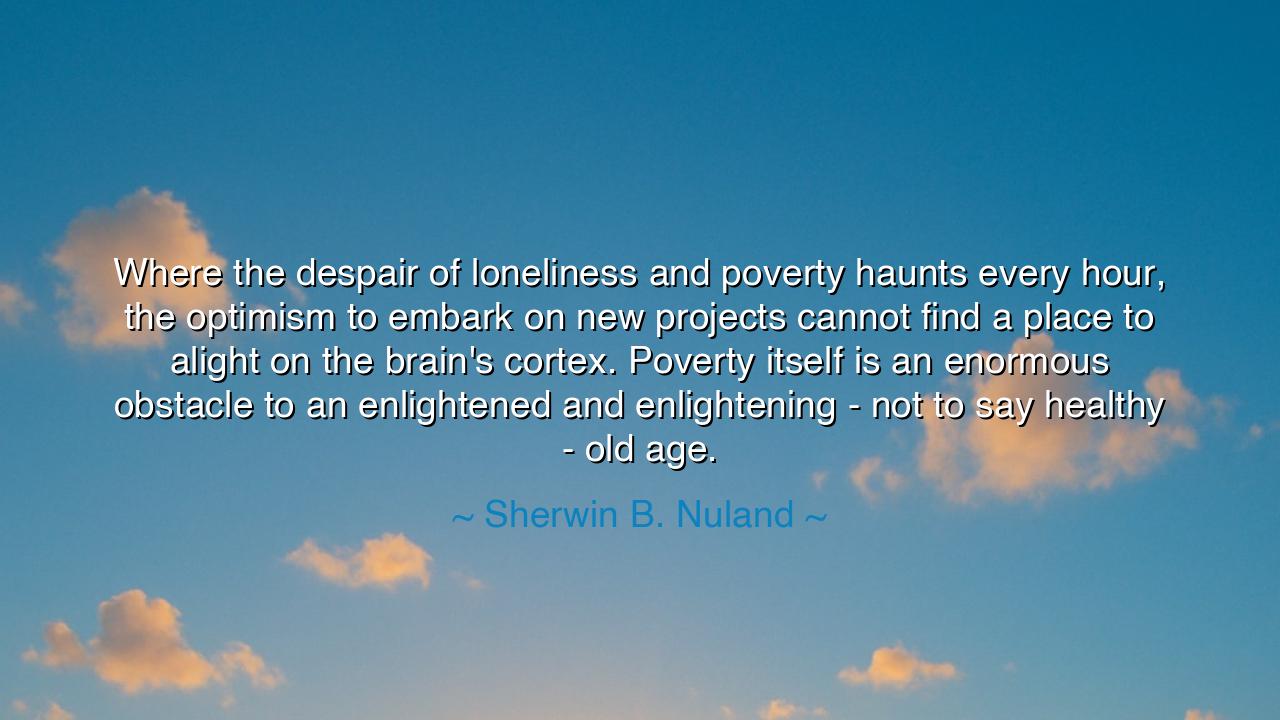
Where the despair of loneliness and poverty haunts every hour
Where the despair of loneliness and poverty haunts every hour, the optimism to embark on new projects cannot find a place to alight on the brain's cortex. Poverty itself is an enormous obstacle to an enlightened and enlightening - not to say healthy - old age.






"Where the despair of loneliness and poverty haunts every hour, the optimism to embark on new projects cannot find a place to alight on the brain's cortex. Poverty itself is an enormous obstacle to an enlightened and enlightening - not to say healthy - old age." – Sherwin B. Nuland
In the journey of life, there is a profound truth that resounds through the ages: poverty is not merely the lack of material wealth, but an unseen chain that shackles the mind, the heart, and the soul. Sherwin B. Nuland’s words echo this bitter reality—that when despair, loneliness, and the harshness of poverty permeate every waking hour, the spark of hope—the optimism to embark on new ventures, to dream new dreams, and to rise above the crushing weight of circumstance—becomes nearly impossible. It is in these moments of deprivation, where even the most basic needs are unmet, that the mental and emotional resources required to pursue new goals with vigor and vision are smothered.
The ancient world, too, understood the crippling power of poverty and despair. In the stories of the great heroes—the warriors, kings, and philosophers—we find that it was often the poorest among them who struggled most to rise above their station. Consider the tale of Diogenes, the Cynic philosopher, who lived in a barrel and rejected the material excesses of the world. Though Diogenes spoke with great wisdom about the freedom that comes from simplicity, it was also clear that his austere life, marked by poverty, limited his ability to fully engage in the broader philosophical conversations of his time. Poverty, in his case, became not just a moral statement, but a physical barrier to his potential.
Nuland’s reflection underscores the emotional toll that poverty takes on the mind. The weight of constant worry over survival—whether one will have food to eat, shelter to call home, or the security of knowing that tomorrow will not bring further hardship—leaves little room for the light of creativity, curiosity, or the ambition needed for self-actualization. The wise Socrates often spoke of the importance of a clear and peaceful mind for the pursuit of wisdom. Yet, how can the mind be clear when it is clouded by the despair of not knowing where the next meal will come from, or how one will face another day? Poverty, then, becomes not only a physical deprivation but a mental one as well, preventing the individual from achieving the heights of intellectual and emotional fulfillment that might otherwise be within their reach.
The ancient philosophers and sages taught that true wisdom requires a balance between the mind, the body, and the environment. Aristotle, in his work Nicomachean Ethics, believed that happiness—the ultimate goal of human life—required a certain level of material security, without which the soul could not flourish. Even Buddha taught that suffering arises from unmet needs, but also from an imbalance in one’s inner peace. Poverty and despair are not just conditions of the body; they are states of being that distort the ability to seek wisdom, joy, and enlightenment. It is clear, then, that poverty stands as a barrier to living a fulfilled and enlightened life, particularly in old age when the mind and body are more fragile and in need of support.
The profound lesson here is not merely about the material poverty that Nuland speaks of, but the poverty of spirit that often accompanies it. Optimism, that light of possibility, requires a fertile soil in which to take root. Without the resources—both material and mental—to dream and plan, the seeds of hope will not grow. This is why, as we age, the absence of sufficient resources can be such a great impediment to true health and wisdom. In the twilight years of life, it is not just physical sustenance that is needed, but the spiritual nourishment that comes from being able to engage with the world in a meaningful way, to pursue projects that bring joy and fulfillment, and to contribute to the lives of others.
In practical terms, Nuland’s words are a call to society, to care for the elderly and the impoverished, so that they may maintain dignity and find a sense of purpose as they grow older. It is not enough to provide the basics of survival; we must also ensure that those who have given so much in their lives are afforded the opportunity to continue living with purpose and hope. Education, access to healthcare, and community support are the pillars upon which a meaningful and healthy old age is built. We must strive to create a world in which the old can continue to contribute and create, where poverty does not trap the spirit, but where every individual, no matter their age, can find their place in the story of life.
Let this be the lesson we carry forward: wisdom and well-being require more than just survival; they require the space to dream, to grow, and to connect. We must work to create a world where resources are available to those in need, particularly the elderly, so that they may continue to shape their destinies. In doing so, we ensure that, as we age, we too will find the strength to engage fully with life, unshackled by the burden of poverty, and empowered to live out our fullest potential in every season of life.






AAdministratorAdministrator
Welcome, honored guests. Please leave a comment, we will respond soon